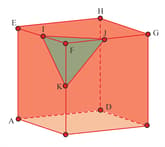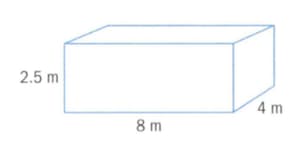Surface Area and Volume of 3D Shapes
Surface Area and Volume of 3D Shapes: Overview
This Topic covers sub-topics such as Volume, Surface Area of a Cuboid, Surface Area of Cube, Volume of a Cube, Rectangular Prisms, Volume of Triangular Prism, Volume of a Prism and, Total Surface Area of Triangular Prism
Important Questions on Surface Area and Volume of 3D Shapes
Find the surface area of the given cuboid by using net diagram.

Find the surface area of a cube by using whose length of each side is .
The perimeter of a triangular prism is units and its lateral surface area is units. Find the height of the prism.
Cube has an edge length of . and are the midpoints of edges and respectively. Vertex has been cut off, as shown in the diagram, by removing pyramid . Find the remaining volume and surface area of the cube.

Find the surface area of the following solid. [Enter the value excluding units]

New designs for products are constantly being created in an effort to find more ecologically friendly packaging and reduce waste of resources. A clever design for packaging toothpaste is a 'tetra pack' which is shaped like a triangular prism. This design not only cuts out the need for an exterior box, but also allows for packs to fit together compactly for more efficient shipping.
If you were to package 10 tetra packs together, how could you configure them to minimize space? Draw a diagram of the configuration, including dimensions.
The space occupied by a solid is called_____
Which is not the standard unit of volume.
Six cubes, each with edge, are joined end to end. Find the surface area of the resulting cuboid in sq. cm.
Two cubes, each with edge, are joined end to end. Find the surface area of the resulting cuboid in sq. cm.
_____
_____
The length, breadth and height of a rectangular solid are in the ratio . If the toal surface area is , find the volume of the solid.
Find the volume of a cube whose:
edge volume _____
Find the volume of a cube whose:
edge volume _____
Find the volume of a cube whose:
edge volume _____
Find the volume of a cube whose:
edge volume _____
Find the volume of a cube whose:
edge volume _____
Find the volume of a cube whose:
edge volume _____
Find the volume of a cube whose:
edge volume _____
